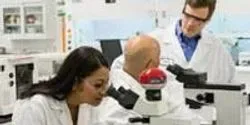Clinical Research Labs

In Human Clinical Trial, UAB to Test Drug Shown to Completely Reverse Diabetes in Human Islets, Mice
New research conducted at the University of Alabama at Birmingham has shown that the common blood pressure drug verapamil completely reverses diabetes in animal models. Now, thanks to a three-year, $2.1 million grant from the JDRF, UAB researchers will begin conducting a potentially groundbreaking clinical trial in 2015 to see if it can do the same in humans.

A novel jelly-like substance developed by Kansas State University researchers was recently issued a U.S. patent. The substance may be used for biomedical applications, ranging from cell culture and drug delivery to repairing and replacing tissue, organs and cartilage.

The joint effort will accelerate the implementation of clinical trials and delivery of stem cell therapies.

In a first step toward future human therapies, researchers at The Saban Research Institute of Children’s Hospital Los Angeles have shown that esophageal tissue can be grown in vivo from both human and mouse cells. The study has been published online in the journal Tissue Engineering, Part A.














